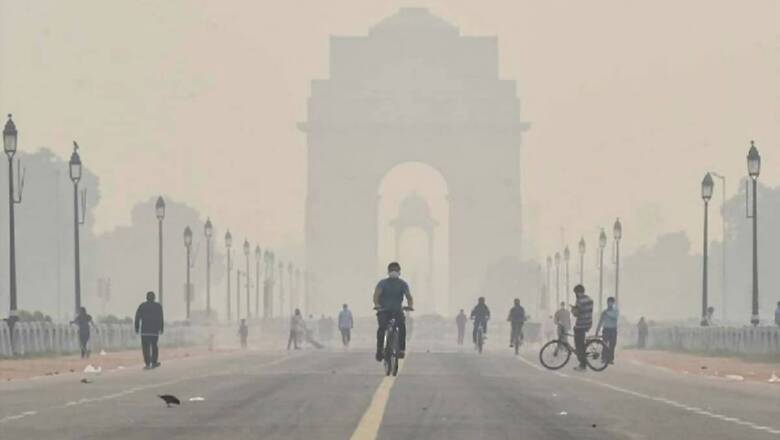
views
The central government issued an ordinance on Wednesday bringing into effect a new law to curb air pollution in the Delhi-National Capital Region (NCR). Under the new law, the government has also created a Commission for Air Quality Management in the National Capital Region and Adjoining Areas. The new legislation is the first on air pollution in the country since the Air (Prevention and Control of Pollution) Act, 1981, was enacted.
But how will this new law be different and how will the commission function? What powers will it wield and what are the provisions for punishment? News18 explains all this and more.
What is the new law brought against air pollution by the government?
The President promulgated the ‘Commission for Air Quality Management in National Capital Region and Adjoining Areas Ordinance, 2020’, on Wednesday to provide for the constitution of a new commission for better coordination, research, identification and resolution of problems surrounding the issue of air quality.
The ordinance was issued after the Solicitor General had informed the Supreme Court on Monday that the government was planning to act against air pollution in North India’s states by introducing a new legislation. The new law provides a legal framework for the commission.
The government felt that there was an absence of an inter-sectorial, multi-state and dynamic body which could specifically address the issue of air pollution in the states of Delhi, Haryana, Rajasthan, Uttar Pradesh and Punjab.
The commission was thus created to fill this vacuum and to also end the need for formation of ad-hoc bodies, task forces and committees. The government reasoned that due to the absence of a more permanent mechanism, the Supreme Court had to devote a lot of its time to create ad-hoc bodies.
Did an authority similar to the commission exist before?
In 1998, on the orders of the Supreme Court, the central government had constituted the Environment Pollution (Prevention and Control) Authority (EPCA) for Delhi-NCR. EPCA was a statutory body which was formed to control environmental pollution and improve the environment in NCR. Its powers and functions were limited to section 5 of the Environment (Protection) Act, 1986 and Delhi-NCR.
EPCA had powers to issue directions in writing to any person, officer or any authority to close, prohibit or regulate any industry or operation and to even stop or regulate electricity supply or water supply or any other service. It could also file criminal complaints against those who defied their directions.
However, they seldom filed complaints or moved courts against violations and largely submitted advisory reports and recommendations to the apex court. These reports ranged from phasing out of polluting coal fired plants, introduction of cleaner fuel, seeking a ban on pet coke, management of paddy stubble and recommendations on public transport.
What will be the new commission’s job and who will be part of it?
Broadly speaking, the commission has to monitor, tackle and research air pollution and specifically monitor measures taken by states against stubble burning, industrial emissions, road dust, vehicular pollution, construction activities, biomass burning and other sources of pollution. The union environment ministry will be the nodal authority of the commission.
The commission will comprise 18 members and will be headed by a full-time chairperson who will be a serving or former Secretary to the Government of India or a Chief Secretary to a state government. The commission will have a representative each from environment ministry, five ex-officio members from states mentioned in the ordinance and, two full-time members who have been or are joint secretaries, one technical member each from Central Pollution Control Board and Indian Space Research Organisation, three independent experts and one member from Niti Aayog.
What are the key powers and functions of the government?
According to the ordinance, the commission broadly has powers to take decisions to protect and improve the air quality in NCR and adjoining areas, including Punjab, which is not a part of NCR. The commission’s decisions will in fact supersede those of state governments in case there is a conflict.
The commission’s powers and functions include planning and execution of a programme to abate air pollution; power to prohibit, close down or restrict industries and activities; creating investigation teams to probe issues of air pollution; inspect premises of plants, machinery, material and issue specific directions to any authority or individual.
The commission will also be required to present an annual report to the central government on their research and action taken to tackle air pollution. This report will be presented before the Parliament. The commission also has powers to make regulations with the prior approval of the central government. Such regulations would have to be notified and it would also have to lay them before each House of Parliament.
Can the commission punish and penalise?
Any violation or non-compliance of the commission’s orders or directions will be an offence. Such offences would be punishable with maximum imprisonment of up to five years and a maximum fine of up to Rs 1 crore or both. However, an offence under the new law shall be non-cognizable and a person has to be tried before a first class judicial magistrate. The commission has powers to take up matters suo motu and file complaints before a first class magistrate.
Read all the Latest News and Breaking News here
















Comments
0 comment